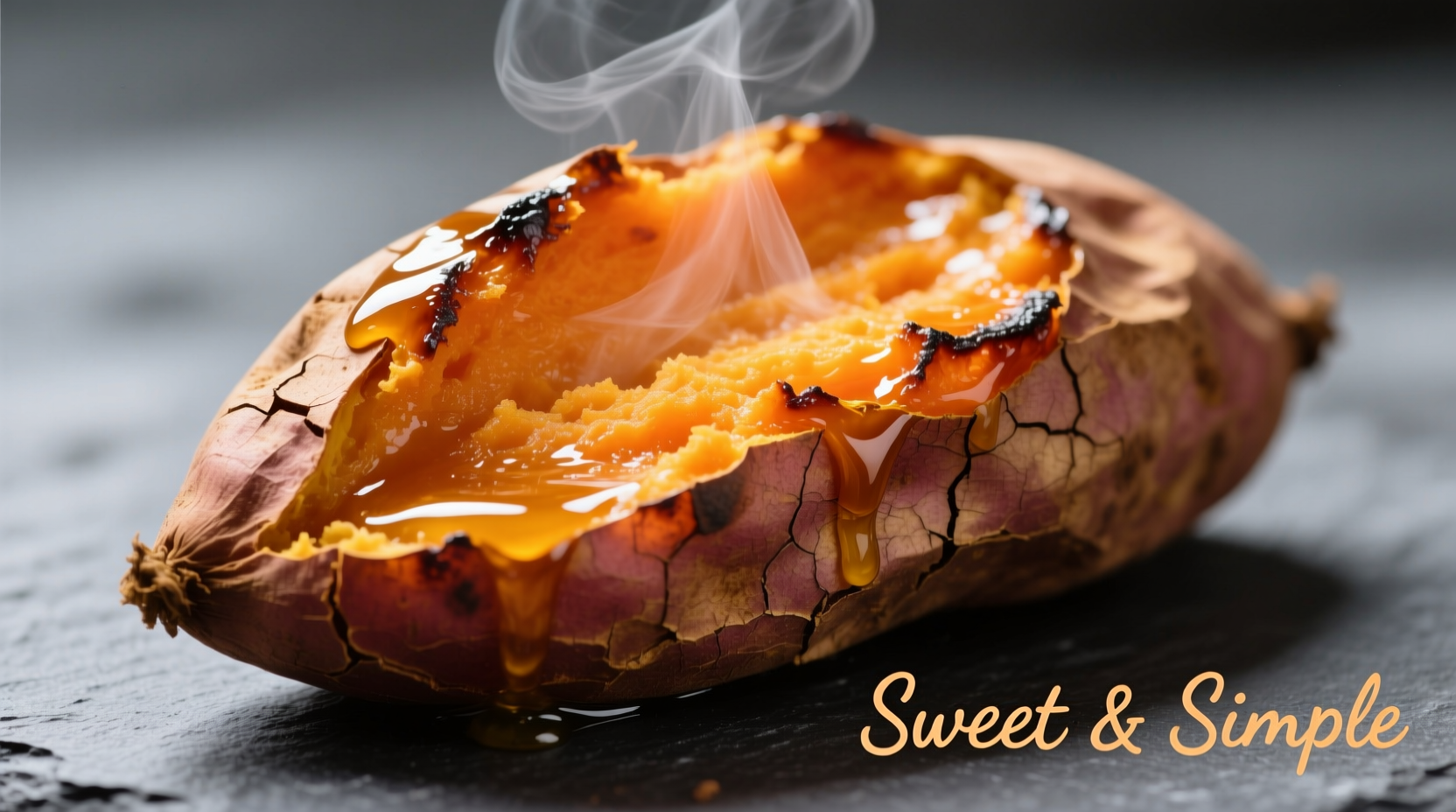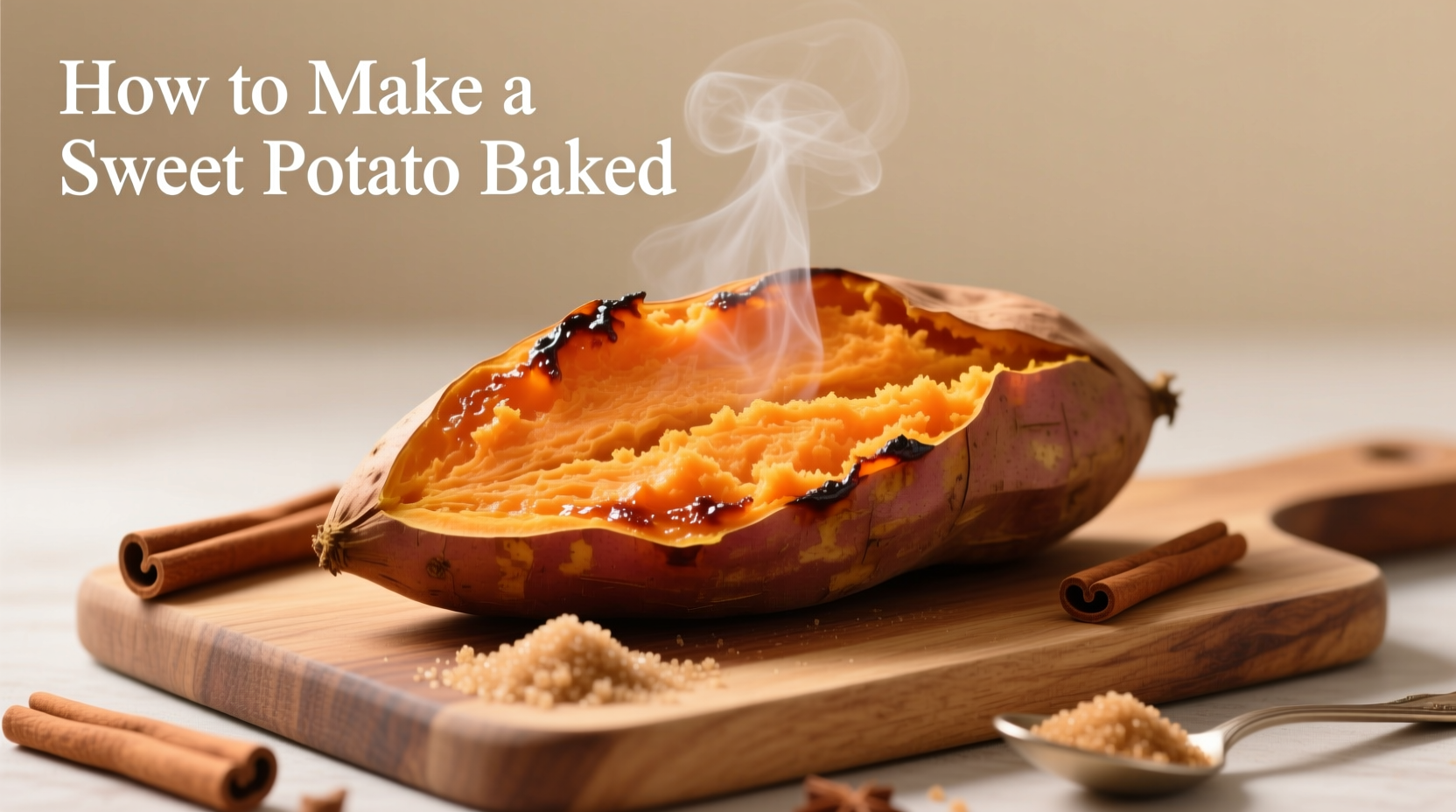The Science Behind Perfectly Baked Sweet Potatoes
Understanding the transformation that happens inside your sweet potato during baking makes all the difference. When heated to 205°F (96°C), the starches in sweet potatoes begin converting to maltose—a natural sugar that creates that signature caramelized sweetness. This critical temperature threshold, verified by the USDA Food Safety and Inspection Service, ensures both safety and optimal flavor development.
What You'll Need
- 1-2 medium sweet potatoes (about 5-7 ounces each)
- Tap water for rinsing
- Fine sea salt (optional)
Step-by-Step Baking Process
Preparation: 5 Minutes
- Choose quality potatoes: Select firm sweet potatoes without soft spots or deep bruises. Medium-sized potatoes (5-7 oz) bake most evenly.
- Wash thoroughly: Scrub skins under cool running water using a vegetable brush to remove dirt. Pat completely dry with paper towels—moisture prevents proper caramelization.
- Poke steam vents: Use a fork to pierce 4-6 holes around each potato. This prevents steam buildup that could cause bursting.
Baking: 40-50 Minutes
- Preheat precisely: Set oven to 400°F (204°C). Professional kitchens and the FoodSafety.gov recommend this temperature for optimal starch conversion.
- Direct placement: Place potatoes directly on the middle oven rack with a baking sheet on the rack below to catch any drips. Avoid aluminum foil—it traps steam and creates boiled texture.
- Monitor internal temperature: After 40 minutes, check doneness by inserting an instant-read thermometer into the thickest part. At 205°F (96°C), the potato is perfectly cooked.
| Sweet Potato Size | Baking Time | Internal Temp |
|---|---|---|
| Small (4-5 oz) | 35-40 minutes | 205°F |
| Medium (5-7 oz) | 40-45 minutes | 205°F |
| Large (8+ oz) | 50-60 minutes | 205°F |
Finishing Touches: 5 Minutes
- Rest before serving: Remove potatoes from oven and let rest 5 minutes. This allows residual heat to complete the cooking process evenly.
- Test texture: Gently squeeze (using oven mitts). Perfectly baked sweet potatoes yield slightly but maintain structure.
- Season simply: Slice open and sprinkle with flaky sea salt to enhance natural sweetness without overpowering.

Troubleshooting Common Issues
Problem: Soggy texture
Solution: Excess moisture prevents proper caramelization. Always dry potatoes thoroughly after washing and avoid wrapping in foil.
Problem: Undercooked center
Solution: Large potatoes need extended time. Check internal temperature rather than relying solely on time. If needed, return to oven in 5-minute increments.
Problem: Burnt skin
Solution: Oven hot spots may cause uneven baking. Rotate potatoes halfway through cooking time for consistent results.
Nutritional Benefits of Baked Sweet Potatoes
Baking preserves more nutrients compared to boiling. According to USDA FoodData Central, a medium baked sweet potato (5.3 oz) provides:
- 160% of your daily vitamin A needs
- 40% of vitamin C requirements
- 5 grams of dietary fiber
- Natural sweetness without added sugars
Serving Suggestions for Maximum Flavor
Enhance your baked sweet potato with these professional chef techniques:
- Temperature contrast: Add a small pat of cold butter that melts slowly into the hot potato
- Texture variation: Top with toasted pecans or pumpkin seeds for crunch
- Flavor layering: Drizzle with orange zest-infused maple syrup for complementary citrus notes
- Savory option: Sprinkle with smoked paprika and crumbled feta for a Mediterranean twist
Storage and Reheating Guidelines
Store cooled baked sweet potatoes in airtight containers for up to 5 days. For best reheating results:
- Oven method: 350°F for 15-20 minutes (preserves texture)
- Quick option: Microwave at 50% power for 2-3 minutes (stir every minute)
- Never reheat at high temperatures—this creates tough, leathery texture
Can I bake sweet potatoes without poking holes?
Poking holes is essential for steam release. Without vents, pressure builds inside the potato which can cause bursting in the oven. Use a fork to create 4-6 evenly spaced holes before baking.
Why does my baked sweet potato have white spots?
White spots indicate undercooking. Sweet potatoes need to reach 205°F internally for starches to fully convert to sugars. Return to oven and check temperature every 5 minutes until reaching the proper internal temperature.
Is baking better than microwaving for sweet potatoes?
Baking produces superior texture and flavor development. The dry heat of an oven allows surface caramelization that microwaves cannot achieve. While microwaving is faster, it often creates uneven texture and fails to develop the complex sweet flavors that occur during proper baking.
How do I prevent sweet potatoes from drying out during baking?
Proper timing prevents dryness. Check potatoes starting at 40 minutes—overbaking causes moisture loss. Medium sweet potatoes typically require 40-45 minutes at 400°F. Always verify doneness with a thermometer rather than relying solely on time.











 浙公网安备
33010002000092号
浙公网安备
33010002000092号 浙B2-20120091-4
浙B2-20120091-4